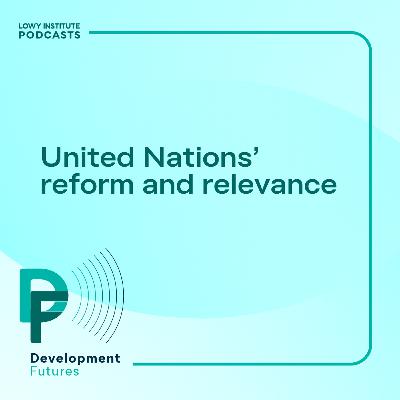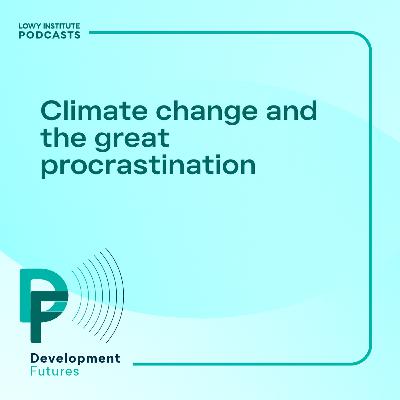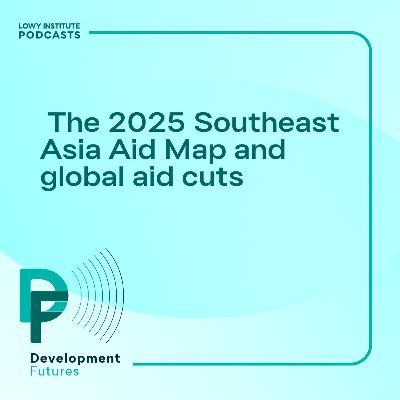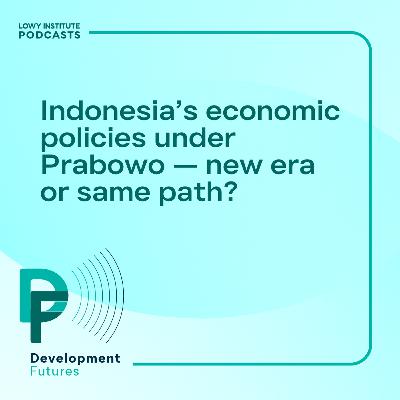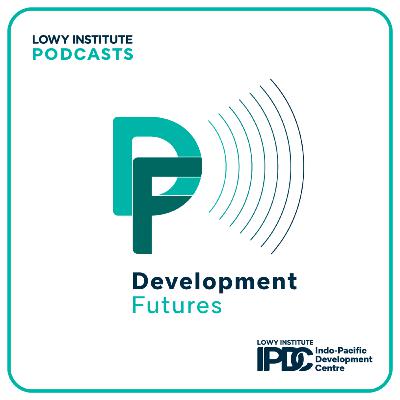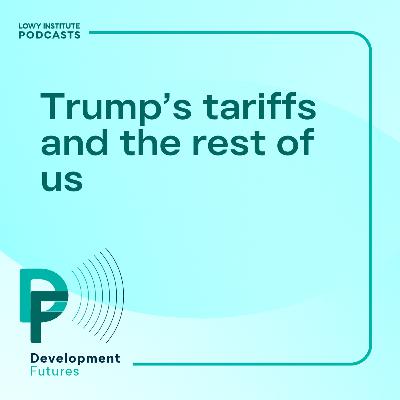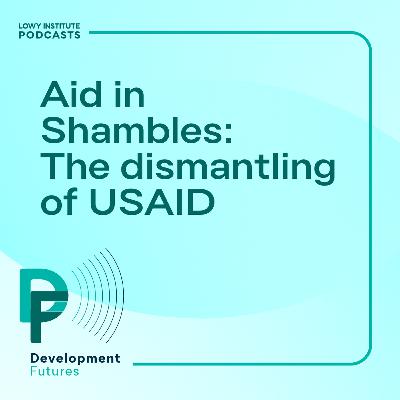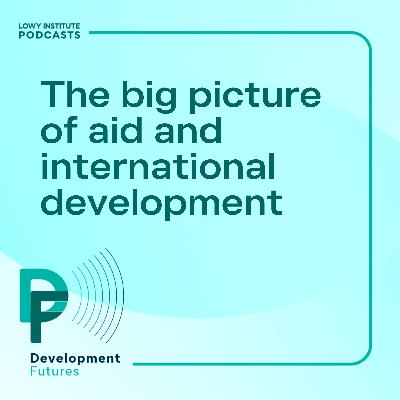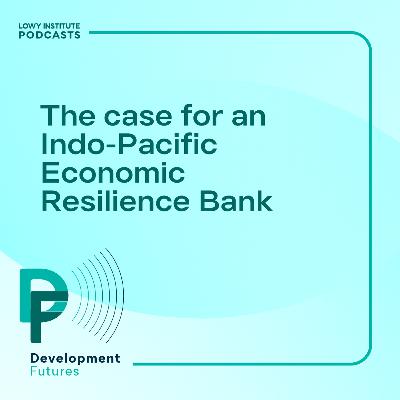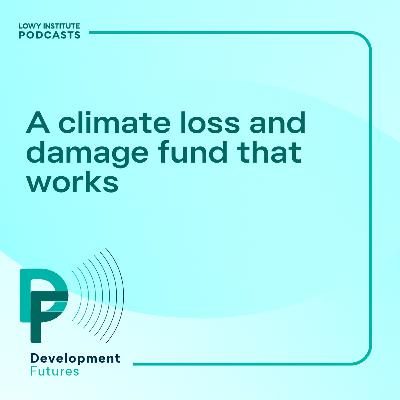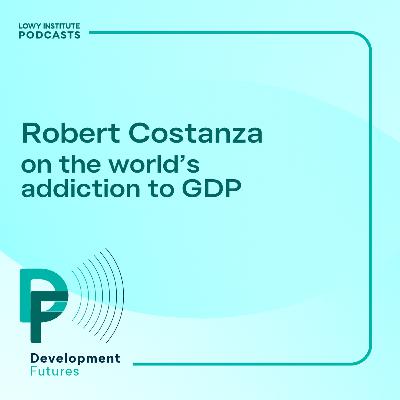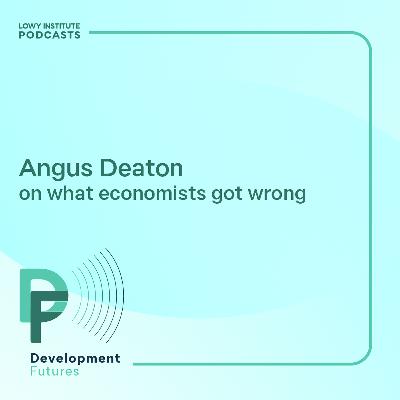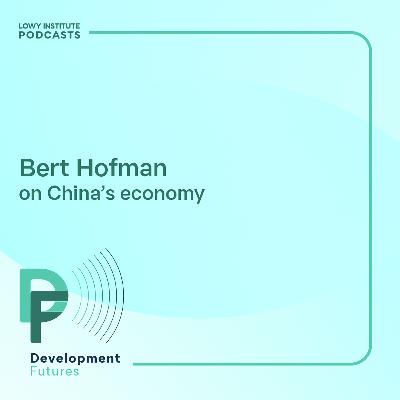Discover Development Futures
Development Futures

Development Futures
Author: Lowy Institute
Subscribed: 8Played: 57Subscribe
Share
© 2025 Lowy Institute
Description
Welcome to Development Futures – a podcast brought to you by the Indo-Pacific Development Centre at the Lowy Institute. In this podcast, our researchers and some of the world’s leading experts discuss fresh policy insights and ideas on the most pressing development issues in the world today.
27 Episodes
Reverse
The United Nations is facing two simultaneous disruptions: the planned UN80 reforms, timed to refine the organisation’s structure and mandate during its 80th anniversary, and budget cuts led by the Trump administration. Lowy Institute Research Fellow Grace Stanhope speaks with UN financing expert and author Dr Ronny Patz, and Ryan Neelam, the Lowy Institute’s Director of Public Opinion and Foreign Policy, about the financial viability and geopolitical dynamics of the UN.See omnystudio.com/listener for privacy information.
The Institute’s Dr Melanie Pill speaks with Professor Thomas Hale, author of Long Problems: Climate change and the challenge of governing across time, about the difficulty of addressing issues, like climate change, that have such distant consequences. They discuss the barriers to addressing and governing long problems, how to build stronger institutions, and how international negotiations and agreements can be better structured to address climate change.See omnystudio.com/listener for privacy information.
As global donors retreat from development finance, Southeast Asia stands to lose billions of dollars in critical support. In this episode, we launch the Lowy Institute’s 2025 Southeast Asia Aid Map and unpack what the wave of US, UK and European aid cuts mean for the region. Roland Rajah, Director of the Institute’s Indo-Pacific Development Centre, is joined by the Map’s lead authors Alexandre Dayant and Grace Stanhope, and Southeast Asia Program Director Susannah Patton, to discuss the risks, regional responses, and how Australia can step up.See omnystudio.com/listener for privacy information.
Indonesian President Prabowo Subianto campaigned on a promise of continuity and better economic performance. Is Prabowo living up to his campaign promises or taking the country in a new direction? The Lowy Institute's Lead Economist, Roland Rajah, speaks with Dr Eve Warburton, Director of the Australian National University's Indonesia Institute, and Indo-Pacific Development Centre Research Fellows Dr Hilman Palaon and Robert Walker to unpack what’s happening and the looming questions over policy, politics, and populism in Prabowo’s Indonesia.See omnystudio.com/listener for privacy information.
The Lowy Institute Re-Cast series republishes the best podcasts from our archives. In case you missed them the first time around or if you want revisit these engaging conversations, the Re-Cast series has you covered. Can we measure national success beyond economic growth? In August 2024, Professor Robert Costanza spoke with the Lowy Institute’s Alexandre Dayant about why countries need to move away from gross domestic product as the measure of economic prosperity and factor in other complementary gauges of success. In a time of high inflation, increased cost of living, and growing environmental degradation, Professor Constanza argues that moving “beyond growth” is essential to achieving sustainable prosperity.See omnystudio.com/listener for privacy information.
Donald Trump has moved quickly to impose tariffs on literally every country in the world. Trump’s tariffs against Australia are not only affecting matters of trade; they potentially infringe Australian sovereignty. The Lowy Institute’s Lead Economist Roland Rajah sits down with Dr Jenny Gordon, Lowy Institute Nonresident Fellow and Honorary Professor at the Australian National University, to discuss the economics and peculiar logic behind Trump’s tariff plans, what it means for smaller countries like Australia, and how they should respond.See omnystudio.com/listener for privacy information.
The Trump administration is taking an axe to the world’s biggest foreign aid program, dismantling its US Agency for International Development and freezing billions of dollars in foreign assistance. The Lowy Institute’s Lead Economist Roland Rajah is joined by Deputy Director of the Indo-Pacific Development Centre, Alexandre Dayant, and Research Associate, Grace Stanhope, to dive into what’s happening, the rationale, and the implications for American soft power and the rest of the world.See omnystudio.com/listener for privacy information.
The Trump administration’s recent dismantling of the US Agency for International Development (USAID) and freeze on most US foreign aid has created havoc within the international aid and development sectors. Prior to these major announcements, the Lowy Institute’s Lead Economist Roland Rajah spoke with Masood Ahmed, President Emeritus of the Center for Global Development, in December last year. They discussed the effectiveness and future of aid and the factors reshaping international development cooperation including climate change, pandemic risks, migration, and domestic politics in donor countries.See omnystudio.com/listener for privacy information.
As part of the Lowy Institute Re-Cast series, we are republishing the best podcasts of 2024. In case you missed them the first time around or if you want revisit these engaging conversations, the Re-Cast series has you covered. As we usher in the new year, the global economy is at a turning point. From confronting an economic development crisis and addressing the good-jobs dilemma, to navigating the climate transition and charting a course towards a more sustainable and equitable form of globalisation, 2024 promises to be an interesting year. In this episode of Development Futures, Alexandre Dayant, the Deputy Director of the Indo-Pacific Development Centre, talks with Harvard professor and economist Dani Rodrik about the challenges of globalisation and the intensification of geopolitics on the global economy. They discuss the role of redistributive domestic policies, the impact of US–China competition on the delivery of global public goods, and the risk of breakdown of the multilateral trade system. These are just a few of the topics covered in this wide-ranging conversation.See omnystudio.com/listener for privacy information.
As part of the Lowy Institute Re-Cast series, we are republishing the best podcasts of 2024. In case you missed them the first time around or if you want revisit these engaging conversations, the Re-Cast series has you covered. China is facing many economic problems, at home and abroad. The two are connected. Weak demand at home has contributed to a sharp rise in Chinese manufacturing exports, especially in green technologies such as electric vehicles. Surging Chinese exports have in turn prompted a backlash from the United States, Europe, and others who accuse China of exporting overcapacity and damaging their own green industrial ambitions. In this episode, Roland Rajah, Director of the Indo-Pacific Development Centre (IPDC), talks with Dr Bert Hofman, one of the leading international experts on China’s economy and a widely respected development economist and practitioner. They discuss China’s development model, the idea of “Peak China”, whether China is exporting overcapacity, what this all means for developing countries, and Bert’s ideas for what the world should be doing in response. Dr Hofman is currently an adjunct professor at the East Asian Institute at the National University of Singapore and before that was with the World Bank for almost three decades, most recently as director of the World Bank’s country office in China.See omnystudio.com/listener for privacy information.
Trillions of dollars are needed to meet the world’s climate and development goals. Joan Larrea, CEO of Convergence, a global blended finance network, speaks with the Lowy Institute’s Roland Rajah about how blended finance, which uses government and philanthropic money to increase private investment, could be the answer. Joan shares her insights on what blended finance can realistically achieve, what’s needed to increase its impact, and how it can help in low income and small island developing countries. See omnystudio.com/listener for privacy information.
Each year, the Lowy Institute updates is Pacific Aid Map – the most comprehensive database tracking aid and development flows to the Pacific Islands region ever assembled. In this episode of Development Futures, lead authors Alexandre Dayant and Riley Duke join Dr Jessica Collins to unpack the key insights from this year’s report and explore key questions. How is the international community supporting the Pacific as it recovers from the pandemic? What role is China playing in the region? And how is geopolitics shaping the allocation of development finance? These questions and more are explored in this episode.See omnystudio.com/listener for privacy information.
In this episode, we explore what might happen at COP29, the upcoming UN climate summit in Baku, Azerbaijan. With global emissions at record highs and climate impacts intensifying, this year’s conference will focus on setting a new climate finance goal to drive global climate action. The Lowy Institute’s Alexandre Dayant is joined by Indo-Pacific Development Centre climate experts Dr Melanie Pill and Georgia Hammersley, who will be hosting side events at the Pacific and Australian pavilions at COP29, as well as Ryan Neelam, Director of the Public Opinion and Foreign Policy Program at the Institute. Together, they dive into key issues on the agenda, potential sticking points, the global context, and what COP29 might mean for the future of global climate action. See omnystudio.com/listener for privacy information.
Eighty years ago, the Bretton Woods agreement shaped the global financial system to build a better world. While its institutions remain vital, they are struggling to meet today’s challenges — climate change, economic insecurity, and a multi-trillion-dollar development financing gap. In this podcast, Lowy Institute researchers Alexandre Dayant, Michelle Lyons and Roland Rajah explore the proposal for an Indo-Pacific Economic Resilience Bank (IERB) — a bank that will aim to diversify critical supply chains, reduce China’s dominance in clean energy, and mobilise new capital for the clean energy transition in the Indo-Pacific. Read and download the Lowy Institute Analysis The case for an Indo-Pacific Economic Resilience Bank by Michelle Lyons, Roland Rajah and Grace Stanhope.See omnystudio.com/listener for privacy information.
In this episode, we delve into the United Nations Loss and Damage Fund, the most concrete effort to address restitution for those impacted by climate change. As the recently appointed board begins crafting a global fund to financially support climate victims, much remains unresolved, including complex questions about who is eligible for money and how they can access it, how to quantify intangible impacts such as the loss of traditional knowledge, and how the Fund itself can raise enough resources to cover escalating costs. To explore these questions, Alexandre Dayant, Deputy Director of the Indo-Pacific Development Centre, talks with IPDC climate experts Dr Melanie Pill and Georgia Hammersley, who recently authored a Lowy Institute Policy Brief outlining recommendations for the Fund’s structure. You can access the Policy Brief here: A climate loss and damage fund that worksSee omnystudio.com/listener for privacy information.
Can we measure national success beyond economic growth? Professor Robert Costanza speaks with the Lowy Institute’s Alexandre Dayant about why countries need to move away from gross domestic product as the measure of economic prosperity and factor in other complementary gauges of success. In a time of high inflation, increased cost of living, and growing environmental degradation, Professor Constanza argues that moving “beyond growth” is essential to achieving sustainable prosperity.See omnystudio.com/listener for privacy information.
Angus Deaton, the 2015 Nobel Prize-winning economist, has dedicated four decades to studying poverty, inequality, health, wellbeing, and economic development. Recently, he strongly criticised his own profession, arguing that economists have overlooked the power dynamics inherent in capitalism.
In this wide-ranging episode of Development Futures, Alexandre Dayant, the Deputy Director of the Lowy Institute’s Indo-Pacific Development Centre, talks with Deaton about the factors behind his shift in thinking and discusses his evolving perspectives on free trade, immigration's impact on American workers, and the role of foreign aid, among other topics.See omnystudio.com/listener for privacy information.
China is facing many economic problems, at home and abroad. The two are connected. Weak demand at home has contributed to a sharp rise in Chinese manufacturing exports, especially in green technologies such as electric vehicles. Surging Chinese exports have in turn prompted a backlash from the United States, Europe, and others who accuse China of exporting overcapacity and damaging their own green industrial ambitions.
In this episode, Roland Rajah, Director of the Indo-Pacific Development Centre (IPDC), talks with Dr Bert Hofman, one of the leading international experts on China’s economy and a widely respected development economist and practitioner. They discuss China’s development model, the idea of “Peak China”, whether China is exporting overcapacity, what this all means for developing countries, and Bert’s ideas for what the world should be doing in response.
Dr Hofman is currently an adjunct professor at the East Asian Institute at the National University of Singapore and before that was with the World Bank for almost three decades, most recently as director of the World Bank’s country office in China.See omnystudio.com/listener for privacy information.
Today, the dynamic duo of globalisation and robotics, which international economist Richard Baldwin calls “globotics”, is disrupting the service sector and professional jobs faster than ever. Digital technology is empowering “white-collar robots” to take over many service sector and professional jobs, while “telemigration” opens doors for skilled workers in low-wage countries to join high-wage economies remotely. But what's next? What new jobs will “globotics” create, and how will they shape the future of work?
In this episode of Development Futures, Alexandre Dayant, the Deputy Director of the Indo-Pacific Development Centre, talks with Richard Baldwin, professor of international economics at the IMD Business School in Lausanne and author of The Globotics Upheaval.
They explore the disruptive impact of globotics on the international labour market, assess the public policies needed to facilitate the adaptation of displaced workers, and expand on the additional complications introduced by geopolitics. These are just a few of the topics covered in this wide-ranging conversation.See omnystudio.com/listener for privacy information.
Climate change is one of the biggest challenges for sustainable development around the world. Large developing economies, particularly in Asia, are now major sources of global emissions but need external assistance to accelerate their transition to clean energy. Meanwhile, many poor and vulnerable countries have contributed little to the climate crisis but face the worst of its escalating impacts.
In this episode of Development Futures, Roland Rajah, Director of the Indo-Pacific Development Centre (IPDC), talks with Melanie Pill and Michelle Lyons — both IPDC climate policy research fellows and experts in climate finance – to examine the key issues and what needs to be done following the “historic” yet disappointing outcomes of the 28th Conference of the Parties (COP28) summit held in the United Arab Emirates at the end of last year.
Among other issues, they discuss the outcomes of the COP28 summit, where to next on climate finance, the synergies and tensions between climate and development, how to accelerate progress in emerging Asian economies, the acute challenges facing vulnerable island states such as in the Pacific, the role and responsibilities of Australia, and their own practical ideas for how the world could do better in delivering on the climate and development progress needed.See omnystudio.com/listener for privacy information.


